I’ve long maintained that Co Waterford is one of Ireland’s best-kept secrets. Not just for its storied history or beautiful scenery, but because it is one of the best food destinations in the country. Dún Artisan Bakery is one of the region’s newest businesses that helps to prove my point.
Open for just over a year and a half, and located off of Dungarvan’s main square, this bustling boulangerie specialises in hand-made, native-flour sourdough breads and whimsically-flavoured, beautifully-laminated pastries.
Owners Fergal Walsh and Caitríona Keating will tell you it took a village to open a bakery during the COVID-19 pandemic. From family friends, actual family, local builders and funding from their Local Enterprise Office, the couple never fail to give credit where credit is due.
However, Dún Artisan Bakery is really a reflection of Fergal and Caitríona themselves: two passionate bakers with a goal to make their business as locally driven - and closed-loop a system - as possible.
Bread careers
Fergal and Caitríona developed separate passions for bread-making before meeting in 2015. Caitríona studied culinary arts in Waterford before starting her career in professional kitchens. By chance, she decided to take a part time job at a bakery in 2014.
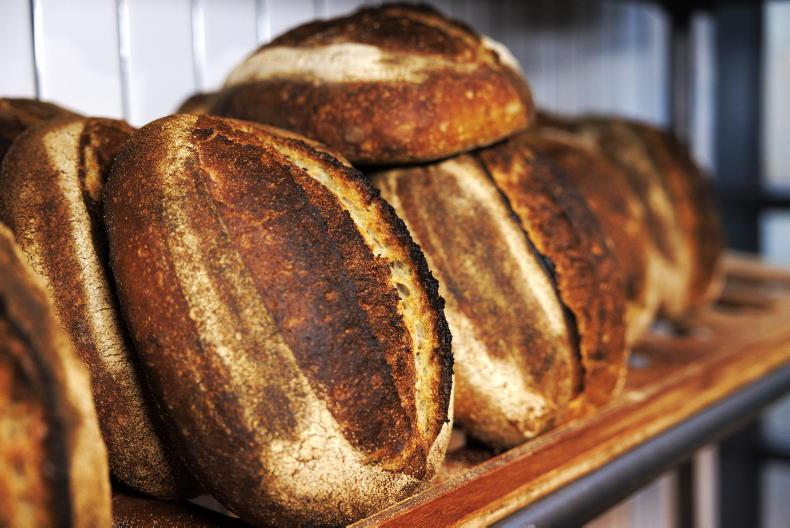
Dún Artisan Bakery specialises in hand-made sourdough bread made with Irish-grown and milled flours \ Donal O' Leary
“I was into fermentation and had studied nutrition, as well, and I wanted to learn how to make bread,” she tells Irish Country Living. “I didn’t realise how much I was going to love it. It just kind of took over and it became my full time job.”
Fergal also worked as a chef in Waterford and says bread-making was something he “fell into” 12 years ago. At Dún, he specialises in their array of handmade pastries while the bread is mainly overseen by Caitríona.
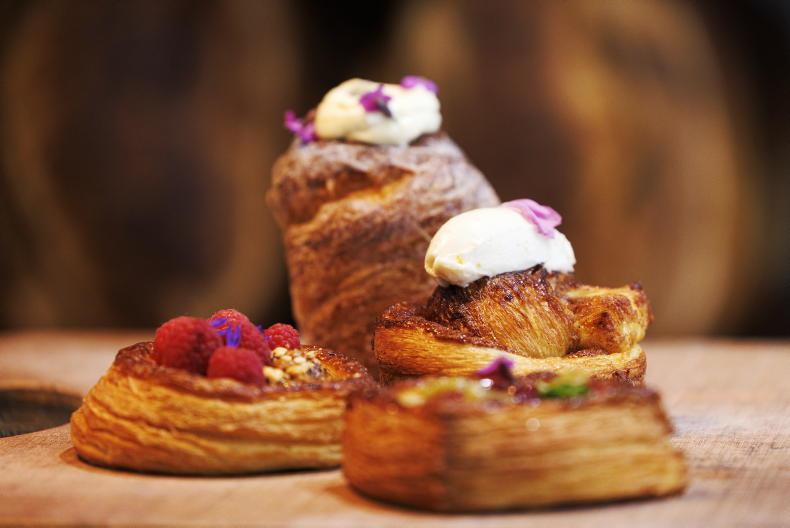
Their pastries also use a mix native flours, which benefit the flavour and texture \ Donal O' Leary
“I was working in a hotel in Waterford,” he says. “I had back surgery, so when I went back into work I ended up in the pastry section and started making sourdough. I really enjoyed it, so I looked for a job in a sourdough bakery. I went to Arun in Dublin and then I travelled, lived in Australia and baked in a lot of places in Ireland.
“I really enjoy the pastry side of things,” he continues. “The whole process. With pastry, you have to hit every little box – one little mistake and you’ll lose your lamination.”
Food with a difference
Having worked their way through some of the country’s best known sourdough bakeries (like Firehouse Bakery in Co Wicklow and Seagull Bakery in nearby Tramore), Fergal and Caitríona are now making the bread and pastries they want to make – with a dose of their own personalities, ethos and approach to flavour.
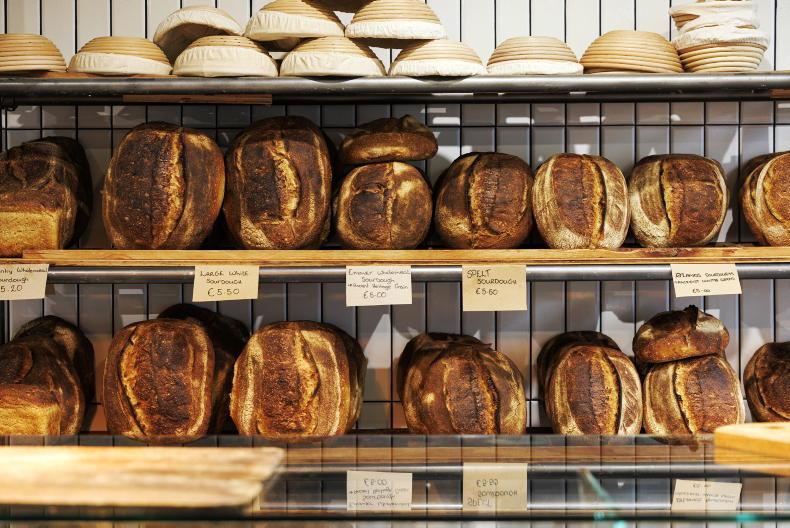
Fergal and Caitríona celebrate the fact that no two loaves of their bread are ever completely the same \ Donal O' Leary
They use a mixture of Irish-grown flours in their breads and pastries (the majority of which they source directly from farmers) and source other ingredients from as close to their locality as they can. For example, the pork used in their sausage rolls comes from Newbard Farm’s heritage pig herd in ?Lismore. They also forage wild garlic, elderflower and other ingredients during the summer months.
Home farm
Many of their ingredients also come from their pride and joy: their ½ acre farm plot in nearby Tramore, where the couple live with their four children Caedyn (17), Shay (4), Cole (4) and Culann (2). The farm has been a work in progress for the past five years and features many of the berries, herbs and summer fruits you find in (or on) their pastries.
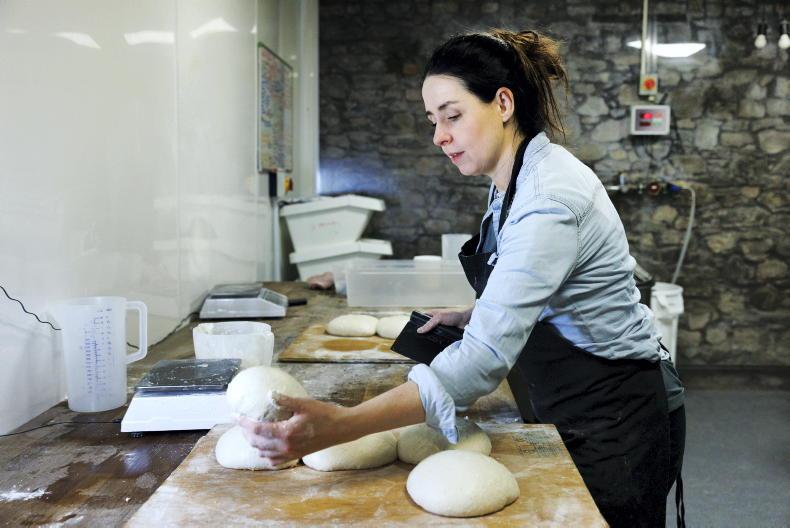
Caitríona and their bakery team make all of their sourdough loaves by hand and slow-prove them to get the flavour and texture she desires \ Donal O' Leary
“By November, 2022, we had just picked our apples, plums, figs and [at that time] we actually still had late season strawberries and raspberries,” Fergal says. “We have a lot of edible flowers - borage and cornflower, which you’ll see in all of our pastries.
“We’re learning as we go,” he continues. “I suppose there’s specific things we’re [still] learning about and then there are certain things we really like that are not readily available in Ireland - like honeyberries, organic blueberries or cranberries. We’ve bulked out our production on these things so we don’t have to go looking for them.”
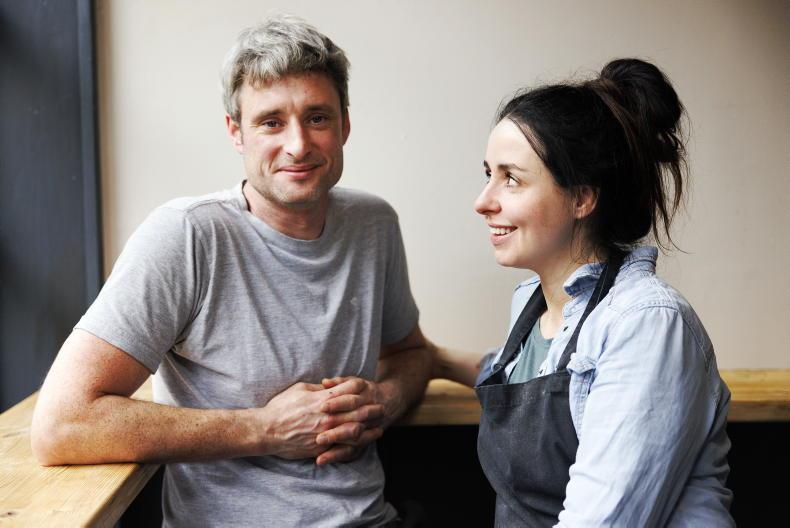
The couple developed separate interests in breadmaking before they met. Caitríona says Fergal always wanted to open a bakery \ Donal O' Leary
The farm is a family affair, the couple tells Irish Country Living. Fergal’s parents both play a huge role in maintaining the gardens throughout the year and their kids get involved, as well.
Bread behaviour
Making sourdough bread by hand is an entirely different process to making bread with baker’s yeast. With sourdough, you are working with air, flour and water. There are many variables which could have an effect on the final loaf.
Fergal and Caitríona celebrate these variables and love that no two loaves of their bread are ever 100% the same. Their locally-sourced flour mix also changes, which can affect the “behaviour” of the sourdough.

The couple developed separate interests in breadmaking before they met. Caitríona says Fergal always wanted to open a bakery \ Donal O' Leary
“If we get a new batch of flour in, we have to [test it] to see how it behaves,” Caitríona explains. “Sometimes, you get a good period of consistency. Then, the seasons will change, or sometimes it can just change in the batch; it’s a natural thing. You need to allow for inconsistencies. Today the bread is really good, but it might not aesthetically look perfect.
“We don’t have fancy equipment; we do everything by hand,” she continues. “I am constantly chasing that ‘perfect’ loaf and sometimes I achieve it but then – can I recreate it? The environment you’re working in, the weather, the time of year, it all has an effect.”
Guidelines
“Our recipes are nearly guidelines,” Fergal adds. “We have so many flours going into everything; sometimes we might need to increase hydration [water content], or increase or reduce the amount of starter – there’s always a little bit of tinkering that goes on.”
Both believe that having a great-tasting loaf and supporting local grain growers is more important than having consistent, “aesthetically-pleasing” loaves.
“Dry bread makes me sad inside,” Caitríona says. “Let’s have a flatter-looking loaf that has that waxy, gorgeous interior - and then it lasts longer on the shelf, as well.”
Cutting out the middle man
Buying flour directly from the producer has added benefits when you are specialising in artisan breads and pastries. Caitríona and Fergal are in constant communication with farmers and millers to discuss their needs and better understand the flours they’re using.
“Our main flour producer would be Oak Forest Mills; Emma [Clutterbuck’s] flour is amazing,” Caitríona says. “She is local to us - literally 35 minutes down the road [in Piltown, Kilkenny]. Working directly with farmers is great. Sometimes they might have a flour they want you to trial, as well, to see what kind of results you get from it. It’s a two way thing. There’s no need to have a middle person.”
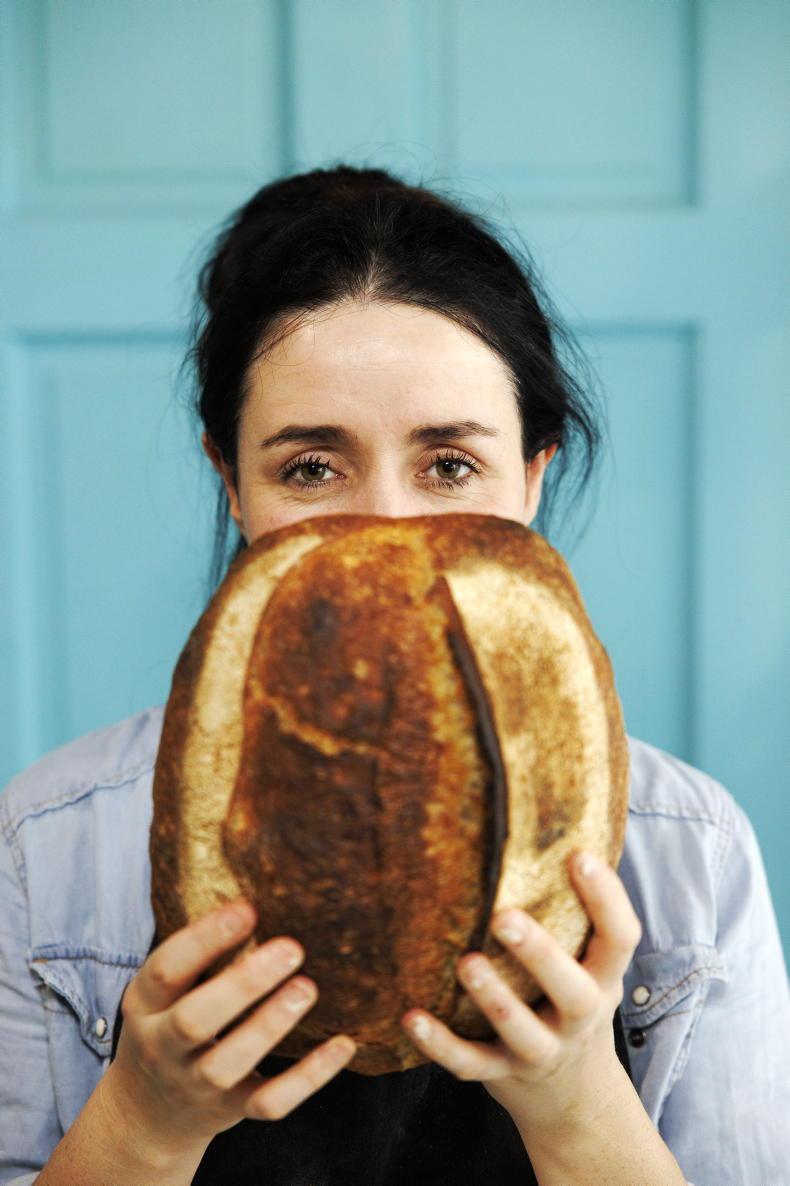
Caitríona says she is always chasing the "perfect" loaf. Nothing makes her sadder than a perfectly shaped but dry loaf of sourdough \ Donal O' Leary
This constant communication also helps them in their ultimate quest: to achieve the loaf of their dreams.
“People always assume you should give [the customer] what they want, but we definitely do what we want,” she laughs. “I make the bread that I want to eat and produce the flavours I aim for - I don’t always achieve them, but I definitely feel that you need to do what you want and then hope that people like it, rather than just fit any mould.”
Sustainable future
Fergal and Caitríona’s vision for Dún is to make the business as circular as it can possibly be, with waste going back into their farm (where possible) and ingredients coming into the bakery from, if not their own farm, as short a distance as possible.
“The goal is to keep pushing on to be more sustainable, because - of course - we’re not 100% sustainable, but we’re making conscious decisions with everything we do,” Caitríona says.
Read more
Food resolutions for 2023 and beyond
Every culture has their favourite savoury pie
I’ve long maintained that Co Waterford is one of Ireland’s best-kept secrets. Not just for its storied history or beautiful scenery, but because it is one of the best food destinations in the country. Dún Artisan Bakery is one of the region’s newest businesses that helps to prove my point.
Open for just over a year and a half, and located off of Dungarvan’s main square, this bustling boulangerie specialises in hand-made, native-flour sourdough breads and whimsically-flavoured, beautifully-laminated pastries.
Owners Fergal Walsh and Caitríona Keating will tell you it took a village to open a bakery during the COVID-19 pandemic. From family friends, actual family, local builders and funding from their Local Enterprise Office, the couple never fail to give credit where credit is due.
However, Dún Artisan Bakery is really a reflection of Fergal and Caitríona themselves: two passionate bakers with a goal to make their business as locally driven - and closed-loop a system - as possible.
Bread careers
Fergal and Caitríona developed separate passions for bread-making before meeting in 2015. Caitríona studied culinary arts in Waterford before starting her career in professional kitchens. By chance, she decided to take a part time job at a bakery in 2014.

Dún Artisan Bakery specialises in hand-made sourdough bread made with Irish-grown and milled flours \ Donal O' Leary
“I was into fermentation and had studied nutrition, as well, and I wanted to learn how to make bread,” she tells Irish Country Living. “I didn’t realise how much I was going to love it. It just kind of took over and it became my full time job.”
Fergal also worked as a chef in Waterford and says bread-making was something he “fell into” 12 years ago. At Dún, he specialises in their array of handmade pastries while the bread is mainly overseen by Caitríona.

Their pastries also use a mix native flours, which benefit the flavour and texture \ Donal O' Leary
“I was working in a hotel in Waterford,” he says. “I had back surgery, so when I went back into work I ended up in the pastry section and started making sourdough. I really enjoyed it, so I looked for a job in a sourdough bakery. I went to Arun in Dublin and then I travelled, lived in Australia and baked in a lot of places in Ireland.
“I really enjoy the pastry side of things,” he continues. “The whole process. With pastry, you have to hit every little box – one little mistake and you’ll lose your lamination.”
Food with a difference
Having worked their way through some of the country’s best known sourdough bakeries (like Firehouse Bakery in Co Wicklow and Seagull Bakery in nearby Tramore), Fergal and Caitríona are now making the bread and pastries they want to make – with a dose of their own personalities, ethos and approach to flavour.

Fergal and Caitríona celebrate the fact that no two loaves of their bread are ever completely the same \ Donal O' Leary
They use a mixture of Irish-grown flours in their breads and pastries (the majority of which they source directly from farmers) and source other ingredients from as close to their locality as they can. For example, the pork used in their sausage rolls comes from Newbard Farm’s heritage pig herd in ?Lismore. They also forage wild garlic, elderflower and other ingredients during the summer months.
Home farm
Many of their ingredients also come from their pride and joy: their ½ acre farm plot in nearby Tramore, where the couple live with their four children Caedyn (17), Shay (4), Cole (4) and Culann (2). The farm has been a work in progress for the past five years and features many of the berries, herbs and summer fruits you find in (or on) their pastries.

Caitríona and their bakery team make all of their sourdough loaves by hand and slow-prove them to get the flavour and texture she desires \ Donal O' Leary
“By November, 2022, we had just picked our apples, plums, figs and [at that time] we actually still had late season strawberries and raspberries,” Fergal says. “We have a lot of edible flowers - borage and cornflower, which you’ll see in all of our pastries.
“We’re learning as we go,” he continues. “I suppose there’s specific things we’re [still] learning about and then there are certain things we really like that are not readily available in Ireland - like honeyberries, organic blueberries or cranberries. We’ve bulked out our production on these things so we don’t have to go looking for them.”

The couple developed separate interests in breadmaking before they met. Caitríona says Fergal always wanted to open a bakery \ Donal O' Leary
The farm is a family affair, the couple tells Irish Country Living. Fergal’s parents both play a huge role in maintaining the gardens throughout the year and their kids get involved, as well.
Bread behaviour
Making sourdough bread by hand is an entirely different process to making bread with baker’s yeast. With sourdough, you are working with air, flour and water. There are many variables which could have an effect on the final loaf.
Fergal and Caitríona celebrate these variables and love that no two loaves of their bread are ever 100% the same. Their locally-sourced flour mix also changes, which can affect the “behaviour” of the sourdough.

The couple developed separate interests in breadmaking before they met. Caitríona says Fergal always wanted to open a bakery \ Donal O' Leary
“If we get a new batch of flour in, we have to [test it] to see how it behaves,” Caitríona explains. “Sometimes, you get a good period of consistency. Then, the seasons will change, or sometimes it can just change in the batch; it’s a natural thing. You need to allow for inconsistencies. Today the bread is really good, but it might not aesthetically look perfect.
“We don’t have fancy equipment; we do everything by hand,” she continues. “I am constantly chasing that ‘perfect’ loaf and sometimes I achieve it but then – can I recreate it? The environment you’re working in, the weather, the time of year, it all has an effect.”
Guidelines
“Our recipes are nearly guidelines,” Fergal adds. “We have so many flours going into everything; sometimes we might need to increase hydration [water content], or increase or reduce the amount of starter – there’s always a little bit of tinkering that goes on.”
Both believe that having a great-tasting loaf and supporting local grain growers is more important than having consistent, “aesthetically-pleasing” loaves.
“Dry bread makes me sad inside,” Caitríona says. “Let’s have a flatter-looking loaf that has that waxy, gorgeous interior - and then it lasts longer on the shelf, as well.”
Cutting out the middle man
Buying flour directly from the producer has added benefits when you are specialising in artisan breads and pastries. Caitríona and Fergal are in constant communication with farmers and millers to discuss their needs and better understand the flours they’re using.
“Our main flour producer would be Oak Forest Mills; Emma [Clutterbuck’s] flour is amazing,” Caitríona says. “She is local to us - literally 35 minutes down the road [in Piltown, Kilkenny]. Working directly with farmers is great. Sometimes they might have a flour they want you to trial, as well, to see what kind of results you get from it. It’s a two way thing. There’s no need to have a middle person.”

Caitríona says she is always chasing the "perfect" loaf. Nothing makes her sadder than a perfectly shaped but dry loaf of sourdough \ Donal O' Leary
This constant communication also helps them in their ultimate quest: to achieve the loaf of their dreams.
“People always assume you should give [the customer] what they want, but we definitely do what we want,” she laughs. “I make the bread that I want to eat and produce the flavours I aim for - I don’t always achieve them, but I definitely feel that you need to do what you want and then hope that people like it, rather than just fit any mould.”
Sustainable future
Fergal and Caitríona’s vision for Dún is to make the business as circular as it can possibly be, with waste going back into their farm (where possible) and ingredients coming into the bakery from, if not their own farm, as short a distance as possible.
“The goal is to keep pushing on to be more sustainable, because - of course - we’re not 100% sustainable, but we’re making conscious decisions with everything we do,” Caitríona says.
Read more
Food resolutions for 2023 and beyond
Every culture has their favourite savoury pie














 This is a subscriber-only article
This is a subscriber-only article








SHARING OPTIONS: